September 13, 2024
Air Date: September 13, 2024
FULL SHOW
SEGMENTS
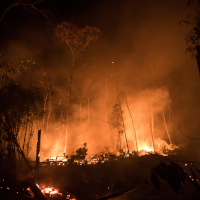
Brazil On Fire
View the page for this story
Heat, drought, and arson are fueling an explosion of fires in Brazil’s Amazon and Pantanal region, home to wetlands and grasslands. Marcio Astrini leads the Climate Observatory, a network of civil society groups. He joins Host Aynsley O’Neill to describe the roots of the crisis and the need for the world to act boldly on climate when Brazil hosts the UN climate talks next year. (09:45)
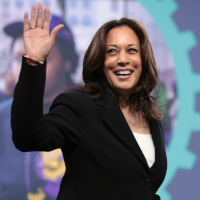
Debate Sidesteps Climate Crisis
/ Marianne LavelleView the page for this story
Climate change got just one token question at the first and perhaps only debate between presidential candidates Donald Trump and Kamala Harris. Marianne Lavelle of Inside Climate News joins Hosts Steve Curwood and Aynsley O’Neill to offer other climate questions that should be asked about the Inflation Reduction Act, holding oil companies accountable and more. (08:39)
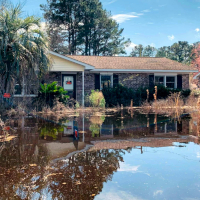
Flood Buyout Delays
/ Daniel ShailerView the page for this story
South Carolina is offering to help homeowners move away from areas plagued by flooding, but at one flagship buyout, only one in ten eligible residents chose to participate. Freelance journalist Daniel Shailer reported on this for Inside Climate News and explains to Living on Earth’s Jenni Doering why delays and predatory real estate practices are getting in the way of moving people out of harms’ way. (12:56)
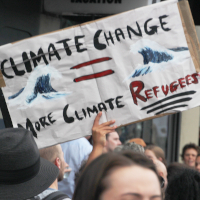
Uprooted By Climate
/ Abrahm LustgartenView the page for this story
The relentless heating of the Earth is prompting people to move after climate-related catastrophes and amid more gradual changes. Journalist Abrahm Lustgarten is the author of On the Move: The Overheating Earth and the Uprooting of America, and he talks with Host Steve Curwood about the northward migration he anticipates as Americans seek to escape punishing heat, fire, and drought. (15:07)
Show Credits and Funders
Show Transcript
240913 Transcript
HOSTS: Steve Curwood, Aynsley O’Neill
GUESTS: Marcio Astrini, Abrahm Lustgarten, Daniel Shailer
REPORTERS: Marianne Lavelle
[THEME]
CURWOOD: From PRX – this is Living On Earth.
[THEME]
CURWOOD: I’m Steve Curwood
O’NEILL: And I’m Aynsley O'Neill
Climate disaster and deception add to misery for flooded out families.
KRUPA: I’ve seen people selling their homes to a flipper, the flipper redoing their homes and not telling anybody that these are flood houses and then new people come into these homes, new families and within six months to a year, they're losing their house.
CURWOOD: Also, the unequal challenges of trying to stay afloat in the climate emergency.
LUSTGARTEN: Wealth equals capacity to be resilient in the face of impacts, and so it affects climate driven migration in a whole bunch of ways but it also affects just our individual ability to protect ourselves or to rebuild in the face of disaster.
CURWOOD: We’ll have those stories and more this week on Living on Earth—stick around!
[NEWSBREAK MUSIC: Boards Of Canada “Zoetrope” from “In A Beautiful Place Out In The Country” (Warp Records 2000)]
[THEME]
Brazil On Fire
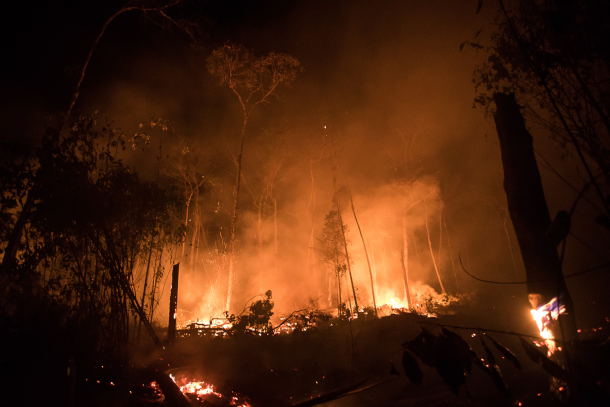
A wildfire burns in 2020 in the Brazilian state of Amazonas. (Photo: Bruno Kelly, Amazônia Real, Wikimedia Commons, CC BY 2.0)
O’NEILL: From PRX and the Jennifer and Ted Stanley Studios at the University of Massachusetts Boston, this is Living on Earth. I’m Aynsley O'Neill.
CURWOOD: And I’m Steve Curwood.
2024 is on track to be the warmest year in human history, according to the UK group Carbon Brief, which says it's likely the average global temperature increase over the preindustrial era will hit 1.57 degrees Centigrade, blowing through the Paris Climate target. Nature is already responding. The Atlantic hurricane season got off to a strong start with Beryl in July and as we prepare this broadcast the storm called Francine is raking the Gulf Coast, especially Louisiana. And in the meantime, California is getting scorched with triple the acreage of wildfires compared to 2023, with major fires also in Idaho, Oregon and Nevada.
O’NEILL: Right, Steve, and as devastating as the fires in the US west are, this is also an especially bad year for fires in Brazil. Its National Institute for Space Research monitors fires and their data show that 2024 has had the most Amazonian wildfire outbreaks since 2005. And this wildfire epidemic is also raging in the Pantanal region of Brazil, which holds both the world’s largest tropical wetland and the world’s largest flooded grassland. Compared to roughly a hundred fires last August in the Pantanal, the data show nearly 4,000 in the same month this year. Much of this ties back to how Brazil is facing its worst drought since recordkeeping began over 70 years ago, so there’s a ton of dry, flammable plant material ready to burn. And on top of that, there’s a political dimension that leads to a lack of enforcement against the perpetrators who are setting many of these fires. I spoke to Marcio Astrini, executive secretary of the Climate Observatory, which is a network of climate-focused civil society organizations. Marcio told me that even as the national government acts on slowing deforestation, it’s not enough to combat wildfires. I asked him what kind of approach the Brazilian government needs to make effective progress on stopping the burning in the Pantanal and the Amazon.
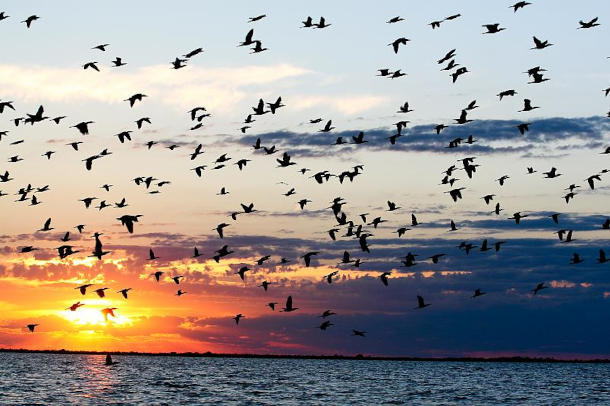
Brazil’s Pantanal region contains both the world’s largest wetland and largest flooded grassland. In August 2023 there were around 100 forest fires in the Pantanal region, but in 2024, there were over 4,000 in the same time period. (Photo: Denis Gustavo, Flickr, CC BY-NC-ND 2.0)
ASTRINI: It's a combination between federal government and local level. They must act together. When you're talking about like forest fires in places like Amazon, in Brazil, there are three main points that drive this forest fire situation. The first one is related to the climate. We have to have one climate that allows forest fires happens in those regions: dry season and high temperatures, mainly are. The second point is about having biomass. And the third one, criminals, we need someone to start the fire in the forest. It's impossible to the government to stop global warming alone, but the government can, for instance, ensure that those who are right now setting fire in the forest, are penalized, are persecuted. And it's really not happening in Brazil, because we don't have a law enough in Brazil, and even we have a lot of people who are under judgment for putting fire in the forest, but till now, no one was charged for that. So we have scenario where the impunity is the rule and the impunity is feeding the criminals.
O'NEILL: Could you elaborate on how political leadership or lack thereof has shaped Brazil's environmental policy in the past couple of years?
ASTRINI: Politicians and the government in general way, they are absolutely necessary to make the situation on climate better or worse. Let's just give an example. Look for what's happening in the Amazon. The Amazon, 90% of deforestation is illegal. Doesn't matter if the government put the enforcement or field operation against criminals and are trying to halt deforestation, if the Congress is giving amnesty to the same criminals. If the Congress is given to the same criminals messages that they will not face any punishment. So even when Congress is analyzing one bill, one project law, it provides message to those who are acting in the field of the forest. The same we can say to the petrol industry, if the petrol industry, if they are having amnesties on that, if they are having this package of benefits coming from the government, they will be incentivized to continuously doing what they are doing. During Bolsonaro term, for instance, even the single speech coming from the former president Bolsonaro was enough to feed the destruction of the forest. When the Brazilian former president said, for instance, that the criminals were right and that the legislation in Brazil were wrong in terms of protecting forests in the country, of course, they were incentivizing the criminals in the country. Bolsonaro government decreased the capacity of the environmental agencies to operate and enforce the legislation in the country. So this situation makes scenario more comfortable to the criminals, to the mafia of deforestation, to invest in forest destruction. So it's absolutely important having one government committed to the legislation and applying the legislation in a practical way.
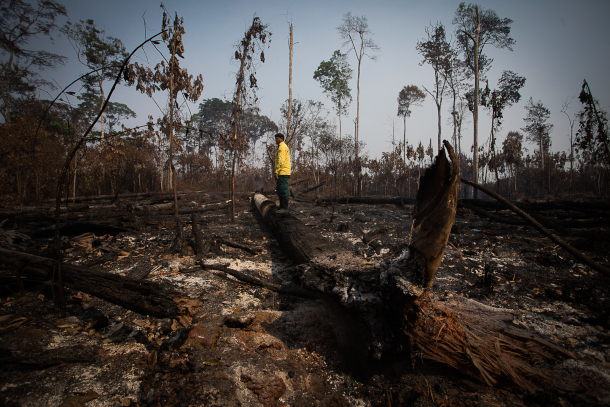
Although Brazil’s government has worked towards reducing deforestation, it is not enough to halt these devastating fires. (Photo: Bruno Kelly, Amazônia Real, Wikimedia Commons, CC BY 2.0)
O'NEILL: I wanna zoom out a little bit and talk about Brazil's role in climate policy on a global stage. So, next year, Brazil will host COP 30, these UN climate talks. Marcio, what would you like to tell the global community about the role that Brazil can play in the fight against climate change?
ASTRINI: So, Brazil plays a very important role in the climate agenda. Brazil is very important in diplomatic issues and negotiations. Brazil is a very important country because he's one of the major emitter countries of carbon, and so Brazil contributes a lot for the current states of the climate around the world. Historically or currently, Brazil release a lot of greenhouse. And, so, to the Brazilian government or other countries, I would say, just... Climate crisis is about a social agenda. It's not about an environmentalist or diplomat trying to achieve an agreement in a closed room or something like that. It's a social issue, the poverty we raise a lot with climate crisis and the poor people around the world, exactly the people who will suffer the inequality. The climate crisis, the machine is a machine of poverty, is a machine of inequality, and we are seeing that's happening right now, and at time you are living right now. Climate crisis is no longer one prediction, no longer something that can happen in the future. It's happening right now. People are dying due climate crise, due climate change, and so there is no longer time to be waste discussing. It's just time to act right now. We have agreements enough, we have reports.
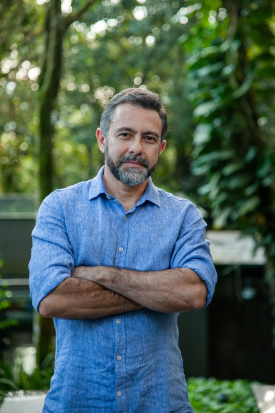
Marcio Astrini is executive secretary of the Climate Observatory. (Photo: Courtesy of Marcio Astrini)
We have scientists saying what must be done in enough quantity to take action. There is no longer excuse on that. So, to the Brazilian government, to the US government, to the China government, to the India government, the Indonesia government, the Russia government doesn't matter where you are, all the countries needed to take action right now. Doesn't work as well just one country, like if a Brazil, or if Indonesia ended deforestation, if India, anywhere, and China, doesn't address the fossil fuels issue, because we're gonna lose the forest if we don't solve fossil fuels issue around the world. So, the Brazilian government has a very important situation hosting the COP 30. There are a lot of expectations over the climate conference in Brazil, and Brazilian government must have courage to push ahead the phase out fossil fuel agenda and showing that it's possible, also adopting important actions and measures internally, leading by example, and the best way to do that is ending deforestation mainly in the Amazons.
O'NEILL: Marcio Astrini is the executive secretary of the Climate Observatory. Marcio, thank you so much for joining me today.
ASTRINI: Thank you for the invitation. It was a really pleasure. Thank you.
Related links:
- Reuters | “Brazil’s Amazon Rainforest Fires in August Reach 14-Year High”
- More about the Climate Observatory
[MUSIC: Adam Ben Ezra, “Can't Stop Running", dedicated to BassTheWorld.com fans, by Adam Ben Ezra, on Can’t Stop Running and video on BassTheWorld.com]
CURWOOD: The outcome of the 2024 US presidential election could profoundly shape the future of the climate and environment both at home and around the globe. What issues are you most interested in having us cover? Let us know by sending us a written or audio message at comments@loe.org. So, email us, at comments@loe.org! And please include a daytime phone number where we can reach you to verify your submission.
[MUSIC: Adam Ben Ezra, “Can't Stop Running", dedicated to BassTheWorld.com fans, by Adam Ben Ezra, on Can’t Stop Running and video on BassTheWorld.com]
CURWOOD: Coming up after the break, the climate crisis barely made it into the first debate between presidential contenders Donald Trump and Kamala Harris. Stay tuned to Living on Earth.
ANNOUNCER: Support for Living on Earth comes from Sailors for the Sea and Oceana. Helping boaters race clean, sail green and protect the seas they love. More information @sailorsforthesea.org.
[CUTAWAY MUSIC: Yo-Yo Ma, Chris Thile, Edgar Meyer: Bach Trio Sonata No. 6 in G Major, BWV 530: I. Vivace on Bach Trios, by Johann Sebastian Bach, Nonesuch Records]
Debate Sidesteps Climate Crisis
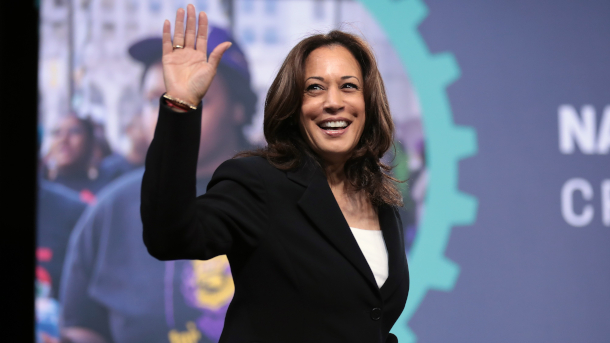
In the debate, Kamala Harris touted both the Biden administration’s expansion of domestic oil and gas production and its investments in clean energy. (Photo: Pachatai, Flickr, CC BY-NC-ND 2.0)
O’NEILL: It’s Living on Earth, I’m Aynsley O’Neill.
CURWOOD: And I’m Steve Curwood.
Climate change did get some airtime in the one and possibly only debate between presidential candidates Donald Trump and Kamala Harris, but it was only a sidebar to the economy, immigration and abortion.
O’NEILL: Yeah, Steve, if you were looking to the debate to see what direction the candidates might take the country on climate, you didn’t get much. So here to talk about what we wish we had heard more of in this debate is Marianne Lavelle, with our media partner Inside Climate News. Welcome back to Living on Earth, Marianne!
LAVELLE: Thanks so much for having me.
CURWOOD: So Marianne, besides the back and forth on fracking, there was only one explicit question on climate change in this debate, and it was squeezed in at the very end.
O’NEILL: Yeah, with each candidate getting a grand total of sixty seconds to say their piece.
LAVELLE: Not much time at all to talk about this existential crisis. Yeah, so both candidates walked a fine line here when discussing fracking and the direct climate question. They seemed to be primarily trying to please middle of the road moderates who could swing the election.

Donald Trump claimed he “got the oil business going like nobody has ever done before.” (Photo: Gage Skidmore, Flickr, CC BY-SA 2.0)
HARRIS: The young people of America care deeply about this issue, and I am proud that as vice president, over the last four years, we have invested a trillion dollars in a clean energy economy, while we have also increased domestic gas production to historic levels. We have created over 800,000 new manufacturing jobs while I have been vice president, we have invested in clean energy to the point that we are opening up factories around the world.
CURWOOD: So, it seems pretty clear that former President Trump and Vice President Harris were focused on making their respective bases just happy enough.
LAVELLE: Yes, you heard Harris emphasize an “all of the above” type approach to energy as well as the Biden administration’s record on creating domestic clean energy manufacturing jobs. In his climate answer Trump made sure to mention his support of tariffs on Chinese cars before veering off topic entirely and accusing president Biden and his son of corruption. But elsewhere in the debate, energy policy was clearly on Trump’s mind and even before the moderators raised the climate question he voiced his fears about a Harris administration.
TRUMP: They'll go back to destroying our country, and oil will be dead. Fossil fuel will be dead. We'll go back to windmills, and we'll go back to solar, where they need a whole desert to get some energy to come out.
LAVELLE: He implied that in contrast, a Trump administration would be cozy with big oil.
TRUMP: So I got the oil business going like nobody has ever done before. They took when they took over, they got rid of it, started getting rid of it, and the prices were going up the roof.
CURWOOD: Well, just a note, the Biden administration has actually made the US the highest producing oil nation in the history of the world.
LAVELLE: Right.
O’NEILL: So I would say, after this debate, we didn’t really hear anything new from either of these candidates on climate. There wasn’t much of a roadmap in terms of where these campaigns would go on climate policy.
LAVELLE: I’d also note that Harris missed an opportunity to separate herself from Biden. Besides rehashing what the administration has already done, she really didn’t outline what further steps in the climate agenda she would take. Overall, the conversation was incredibly detached from the climate emergency at hand. It ended up being about who supports fracking and big oil more. So you could say the fossil fuel industry won this debate.
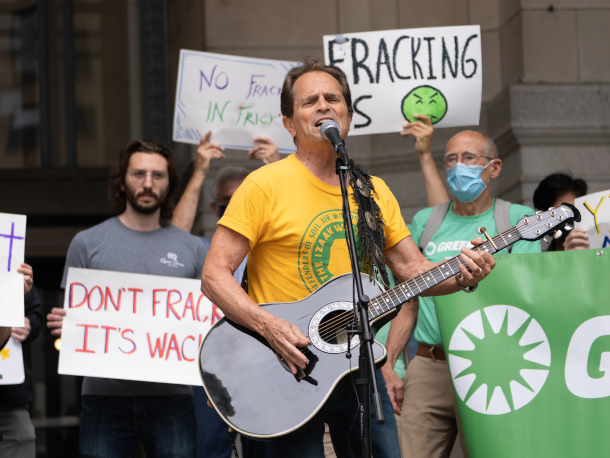
In her 2020 presidential campaign Harris said she would ban fracking. In the September 2024 debate the vice president made it clear that she no longer supports a fracking ban. In this photo, Allegheny County, Pennsylvania community members protest fracking in county parks. (Photo: Mark Dixon, Flickr, CC BY 2.0)
CURWOOD: Yeah, without a word of say the fires out to the west or the big storm in the Gulf of Mexico as the debate was going on. So, Marianne, you and your colleagues at InsideClimate put together a list of ten questions on climate that you thought should have been asked at this debate. Can you start please with Donald Trump. What would you have really liked to hear the moderators attempt to get him to respond to?
LAVELLE: So Trump has in the past said he would reverse the Inflation Reduction Act and take back unspent IRA funds. But what I’d like to know is, what would he plan to do about the hundreds of projects already in the works, many in Republican states?
O’NEILL: Many of which we know are creating jobs.
LAVELLE: Right, the nonprofit group Environmental Entrepreneurs estimates over a hundred thousand jobs are being created because of the Inflation Reduction Act.
CURWOOD: Alright Marianne, what else do you think the moderators should have pressed Mr. Trump on climate issues?
LAVELLE: They could have brought up his stance on wind energy. Harris goaded Trump at one point, saying, "He will talk about, windmills cause cancer." He didn’t really respond to that, but the moment made clear that the Harris campaign sees Trump's views on wind energy as something they can use to ridicule him, and really drive home the point that she made at the convention, that "Donald Trump is an unserious man." But she has said the consequences of having him back in the White House would be extremely serious, and that is certainly true for the future of clean energy. That is why he really should be asked directly what his plans are for wind power. It's now providing 10 percent of power nationwide, and in Texas, which has more wind energy than any other state, it is providing nearly 30 percent of electricity. I would like to ask him would you get rid of wind power? And what would you replace it with?
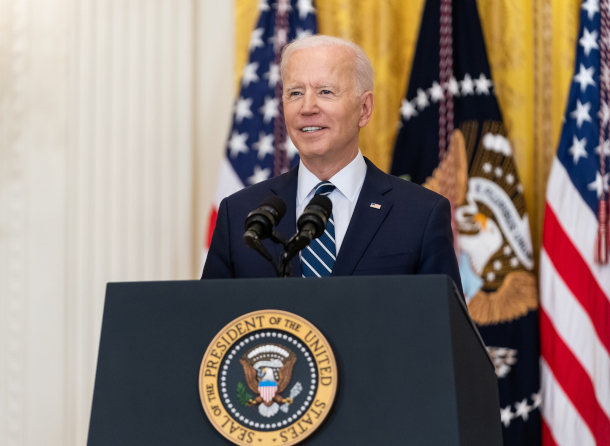
The U.S. has become the highest producing oil nation in the history of the world under the Biden Administration. (Photo: Prachatai, Flickr, CC BY-NC-ND 2.0)
O’NEILL: Well what about Vice President Harris? What was missing from her in this debate when it comes to the climate change question?
LAVELLE: Throughout the campaign, Harris has celebrated her history as a prosecutor who took on big oil and other powerful corporations. But we definitely did not see commitments to that kind of accountability in this debate. In fact, she spent most of the time defending fracking and highlighting the Biden administration’s expansion of domestic oil production.
O’NEILL: Sounds like she focused on how she would eliminate foreign oil reliance more than fossil fuel reliance.
LAVELLE: Yes, a big nod to those moderate voters again.
O’NEILL: What else about climate do you think Vice President Harris should have been asked?
LAVELLE: I would have liked the moderators to ask Harris to what extent she would take on big oil. Would she direct the Justice Dept. to take on those companies?
CURWOOD: Well, of course, there’s big oil on one hand, but there’s a lot of little, but highly influential firms that frack as well.
LAVELLE: Well, Steve, as we discussed, both candidates dug their heels in on fracking. But neither bothered to say what they would do about the water and air pollution that comes from fracking. And it’s interesting that Harris did not even mention the words environmental justice.
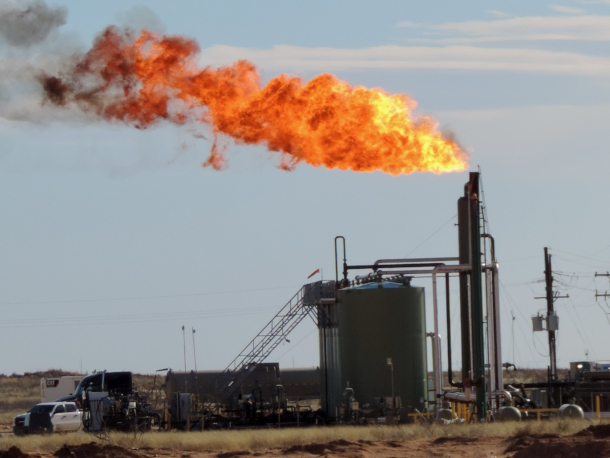
In addition to releasing planet-warming fossil fuels, fracking has local environmental impacts such as polluting water and air. (Photo: WildEarth Guardians, Flickr, CC BY-NC-ND 2.0).
O’NEILL: Yeah, talk about a missed opportunity on her part. Marianne, before you go, what are you really hoping to hear from the candidates about their climate policies in these few short weeks before voters head to the polls?
LAVELLE: Well, Aynsley, I’m not holding my breath. Although the world is on fire it just doesn’t seem that our politics reflect that at a moment as divisive as this one. And you know, I have a lot of questions about how motivated some young climate voters will be to get out and vote if Harris is offering nothing new on climate. In fact, the Sunrise Movement called Harris out for failing to deliver a bold, new climate policy that can meet the scale and urgency of the crisis.
O’NEILL: Well, and polling shows that young voters see climate change as a major issue that’s shaping their vote.
CURWOOD: And the day after the election, one might see that it would or would not have made a crucial difference in the swing states. Marianne Lavelle is a reporter with our media partner, InsideClimate News. Thank you so much for joining us today, Marianne!
O’NEILL: Yes, thank you!
LAVELLE: Thank you both.
Related links:
- Inside Climate News | “10 Tough Climate Questions for the Presidential Debate”
- Read the statement from the Sunrise Movement and other youth groups to Harris
- Watch the full debate
[MUSIC: Gary Burton, “Get Up and Go” on Next Generation, by Vadim Neselovskyi, Concord Jazz Records]
Flood Buyout Delays
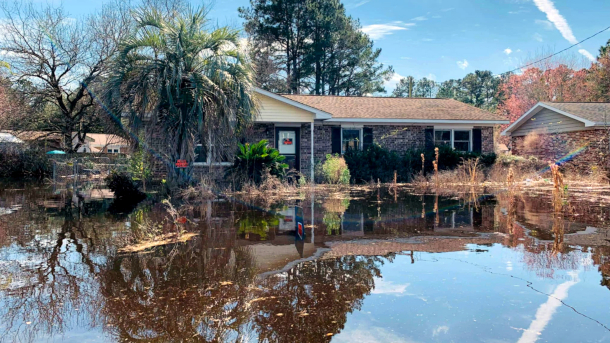
Melissa Krupa’s Socastee home after a flood in February 2021, weeks before the first grants to start a buyout program were approved. (Photo: Courtesy of Melissa Krupa)
O’NEILL: Coastal and low-lying areas across the US are experiencing increased flooding linked to the climate crisis, leaving homeowners with costly water damage. The state of South Carolina is facing the reality that in some areas managed retreat may be the only option. A 2023 resilience report found that the state may need to buy out and tear down roughly 700,000 flood-prone homes. South Carolina is one of the few states with a dedicated climate resiliency office and a plan for adapting to climate change. In some coastal areas the state is offering to help homeowners move by buying out homes from residents living in floodplains and turning the land into green space, better adapted to absorbing and retaining water. Daniel Shailer is a freelance climate journalist who reported on this buyout program as part of a climate adaptation series for our partner InsideClimate News. He joined Living on Earth’s Jenni Doering to discuss how this is playing out in the South Carolina town of Socastee.
DOERING: So why is South Carolina so vulnerable to flooding these days?
SHAILER: It's a good question and I think we think of sea level rise as a kind of homogenous, equal threat around the world, but it's a much more localized thing. And because of the way that ocean currents are changing along the Gulf states on the East Coast, the sea level is actually rising locally much faster and at an accelerated rate. So South Carolina is kind of on the front line, along with Florida, North Carolina of that change, but at the same time, South Carolina, for other reasons is one of the fastest growing states in the country. Coastal property is on the up. Second homes people moving to the coast. So those two things in conjunction, more and more people moving into a coastal area that is more and more under threat from sea level rise. That's one of the reasons that South Carolina and coastal South Carolina is at climate risk.
DOERING: And when you add to that, these storms that can bring intense downpours, that's a whole other flooding issue as well.
SHAILER: Yeah, as you probably be aware. Some scientists like to call them kind of rain bursts or rain bombs, but warmer air, for listeners that aren't familiar, warmer air holds more moisture. And so it's not that there's more water in the actual water cycle, but when it does rain, it rains in kind of biblical bursts of huge amounts of rain. And so that works with sea level rise, because it's not just like waves lapping over the top of the coast, but as sea levels rise, the water underneath the Earth, the groundwater table, also rises. That means when a rain burst or a rain bomb arrives, there's less kind of dry, unsaturated earth above the ground level to absorb that water. More water ends up, kind of sloshing around on top flooding houses, interrupting people's lives.
DOERING: And meanwhile, you say people are moving into this region, even as the state is acknowledging these risks and actually trying to help people move out. So tell us about this home buyout program that South Carolina is embarking on that caters to some of these climate vulnerable communities. How does this program work?
SHAILER: Yeah, it's part of, I suppose, a more broad changing of coastal resiliency strategy. The prevailing wisdom for a while, I think, has been the coast to getting more vulnerable. Let's hunker down. And hunkering down in a coastal resiliency context looks like sea walls, flood gates, building houses on stilts, basically like not budging but getting prepared in some kind of way. Managed retreat strategy or policy as an idea, is the idea that instead of hunkering down, we will move back away from the coasts. And the most equitable way to do that, when you know some people can't afford to just up and move, is to have a kind of buyout, where the state or federal agency comes along and offers homeowners, typically some kind of amount pegged to the value of their home, to buy their home from them so that they can relocate somewhere more in land. So it is true that South Carolina is, I think it fair to say, ahead of the curve compared to other states. They know how many houses they think will need to retreat back. This is how much it might cost. And they even have what they call a kind of matrix for looking at not just climate risk in terms of low lying ground, sea level rise, rain, but also kind of socio economic factors about which areas might need more help than others. So Socastee was one of those places.
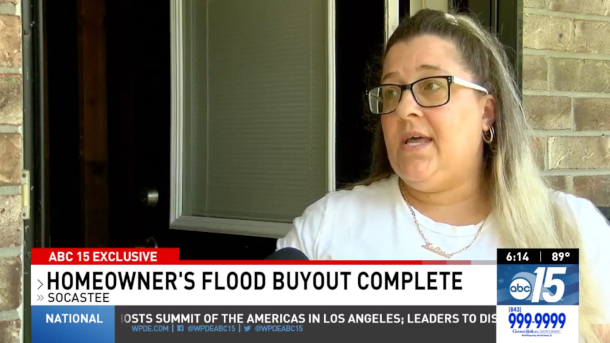
Melissa Krupa spent six years attempting to secure a buyout and the demolition of her Socastee home. (Photo: Screenshot, WPDE video)
DOERING: So how much money is the state able to offer some of these homeowners when they are trying to get them to move out?
SHAILER: It's a little bit of a complex question to answer. Managed retreat is a beautifully simple idea in principle, offer people some money. They just move inland, somewhere safer. Everyone's happy that land becomes typically a green space which absorbs floodwater and then becomes a kind of public asset for people to use, playgrounds, that kind of thing. But in practice, it is almost always a little bit more complicated, if not messy. So the funding question depends where the funding is coming from. In South Carolina and in Socastee, the upper cap was around a quarter of a million dollars, with a couple of things that could make it higher or lower but that was basically, that was the cap, a quarter of a million dollars. Which for some people, was more than enough, for some people, was about right, and some people that have, you know, the really kind of decked out waterfront houses doesn't come near.
DOERING: Yeah, I mean, the government is offering you money to move, but sometimes the price isn't right. So I understand you talked to Melissa Krupa. She participated in this buyout program, she lived in this community Socastee, South Carolina, that you wrote about. Tell us about Melissa.
SHAILER: Melissa is a real force of nature, I think it's fair to say. When I first spoke to her, it was kind of at the tail end of a six year battle for her. First to get a buyout and then to get the state to actually demolish her home like they promised. And I've actually got a clip from Melissa talking about what she went through. Let's take a listen.
KRUPA: 2016 my house flooded with three and a half feet of water in my house, I did start to remodel and rebuild, and then in 2018 I lost my house again to flooding five and a half feet of water. And at that time I realized I had to do something, I couldn't keep rebuilding. I didn't want to live in flood waters, and I knew I had to do something for me and my community because we kept losing our house. Some people in my neighborhood that are closer to the water lost their house like 10 times. So I knew I had to do something and that's when I decided to start speaking up.
DOERING: So Melissa has this conviction, this strong voice, what does she do to try and help her community and help herself as a homeowner?
SHAILER: Yeah. So I suppose the first thing that Melissa does is start casting around among her neighbors, starts looking online and through that she comes across a woman called Harriet Festing. Who runs a group at the time, it was a kind of coalition of maybe 40 or so frontline environmental groups called Anthropocene Alliance that is now well over 300 into 400 groups. But at the time, it was a kind of small organization, and it was Harriet trying to connect groups that were living with climate change already this was back in 2018 with the resources to start speaking up for themselves. So that was the beginning of a six year fight for Melissa and her neighbors. It was only, gosh, only a month ago that her home was actually demolished. So she for two and a half years, after getting the buyout, was ringing up asking, why is my home still up? When is it going to return to green space? That kind of stuff. And even still, Melissa gets calls. She told me from Realtors trying to buy her home that is now a kind of like ghost, I mean, it doesn't exist anymore. She's become a real champion of, you know, not just buyouts, but like, equitable community approaches to dealing with climate change, but it was not an easy road for her.
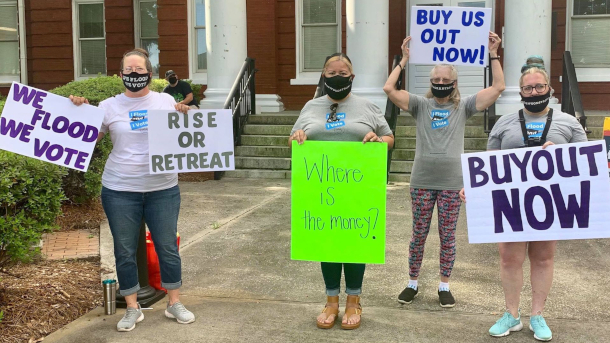
Melissa Krupa (right) uses the language of battle to describe years of fighting: first for a buyout to happen at all, then for the state to offer enough money. (Photo: Courtesy of Melissa Krupa)
DOERING: I understand that in Melissa Krupa's community of Socastee South Carolina, only 1 in 10 eligible homeowners initially signed up for this program. Why is that?
SHAILER: That's a good question and for me, it was kind of the driving question behind this story. And I came to the story expecting a little bit of climate denialism maybe, that in a deep red state, kind of semi rural area, maybe after one or two floods, people weren't willing to accept that this was a risk that not only is going to continue but get worse. That was less the case than I was expecting, to be honest. The people that I spoke to were pretty aware of the risks, because they've been living with it for so long. What actually emerged was a kind of more complicated combination of things. One of them was definitely a different type of denialism, denialism about the buyout itself, whether that was going to happen, because it took so long, one of them was also in the time that the buyout came together and then demolition started, there was essentially a kind of pattern of predatory realtor behavior, we expect was undermining some parts of the buyout.
DOERING: So what's going on there?
SHAILER: That's a good question. So there are no federally uniform regulations for flood disclosure when you're selling a house. But in recent years, different states have taken the initiative to pass state laws about what you have to warn people about if you're selling houses. South Carolina is ahead of the curve on this has pretty strong flood disclosure regulations, but the kind of loophole that we expect was emerging in the time between the flooding and the actual buyout was we looked at deeds, property deeds. And a lot of these houses from after the flood in 2018 were being sold and then switching hands between, often companies with similar but slightly different names, between the agents of those companies. So that we expect by the time of selling it to a new resident, if the company that's owned it in the last like two or three months hasn't experienced any flooding, then at least for the flood repairs, flood history in their ownership, they can quote, unquote, say that that has not been. Now they would still have to take flood risk and so if there were cases where that wasn't happening, that would be, if not, a gray area, then a manipulation of those disclosure laws. But Melissa saw a lot of the fix and flip behavior firsthand with her neighbors, here's another clip from her.
KRUPA: The house behind me, the original owners that bought it in the time they sold it to a flipper. The flipper flipped it. It did not flood in his time, and he sold it to a family, a young family, but the mother had cancer, and they had two young children and within a few months, their house flooded. So here she is dying of cancer, thinking that, you know, she has a home for her children and her husband and now they have no home. And now, not only she's struggling to fight this cancer battle to stay alive as much as she could. She's now trying to figure out the flood situation and how to redo her home.
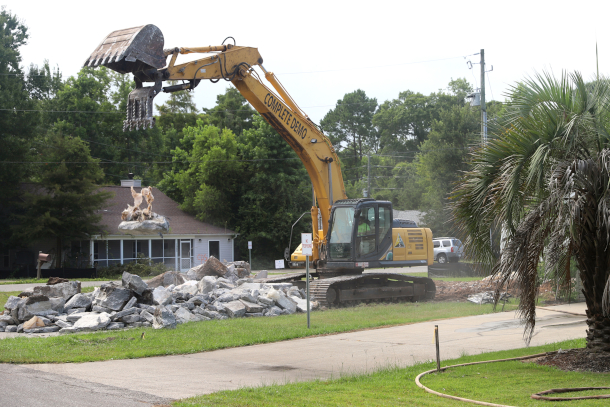
According to the South Carolina Office of Resilience, the start of demolitions in July 2024 “sparked more interest in program participation,” despite applications having closed. (Photo: Courtesy of the South Carolina Office of Resilience)
SHAILER: It's heartbreaking, really. There's 100 personal tragedies, but for the buyout as a whole, you can also see why people that were living there before 2018 could become a part of that.
DOERING: So what can be done to break that vicious cycle of flipping these houses, you know, not warning the new homeowners about the risk new people move in, they get flooded out. Now that South Carolina is embarking on more of these home buyout programs, how can that cycle be stopped?
SHAILER: It's tricky, and it's a combination, I suppose, of nuts and bolts policy stuff and like hearts and minds, persuasion work. Absolutely, when buyouts happen quicker, there's more willingness. So like I say, there was a policy expert who put it really well. It's like catching lightning in a bottle a good buyout. If you get there with the money soon after the flood, why wouldn't someone sign up? After all, the people that participated or sold their houses to realtors were clearly people who were willing to leave. So getting the buyout together more quickly, one tightening up flood disclosure regulations so that there is a more transparency there, and there are some kind of privacy and genuine real estate concerns with that. But one of the workarounds might be that a group called the southern Environmental Law Center are working on, is, instead of requiring realtors to share more of that information, attempting to put together some kind of, like, searchable database of other things that are public information, like neighborhood to neighborhood emergency alerts. If you could put in an address and see, all right, that county in that neighborhood said there's a flood coming, get your sandbags out six times in the last six months. Then, you know, without having to rely on the realtor, this is a flood prone property. So it's about tightening up the timeline, strengthening the flood disclosure regulations, and then also a kind of snowball, like we've talked about. When people begin to see that managed retreat is a real thing and has good outcomes for people. Then the next time managed retreat, their neighbor starts talking about managed retreat, talking about a buyout, they're more likely to, you know, seriously consider being a part of that.
O’NEILL: Daniel Schailer is a freelance climate journalist who reported on this for Inside Climate News. He spoke with Living on Earth’s Jenni Doering.
[MUSIC: Marcus Roberts Trio, Discover Jazz, Live on Vermont PBS]
O’NEILL: Coming up, even when acute disasters aren’t forcing them out, climate change is making some people migrate. That’s just ahead on Living on Earth. Stay with us!
ANNOUNCER: Support for Living on Earth comes from Friends of Smeagull the Seagull and Smeagull’s Guide to Wildlife. It’s all about the wildlife right next door to you! That’s Smeagull, S - M - E - A - G - U - L - L, SmeagullGuide.org.
[CUTAWAY MUSIC: Herbie Hancock, “Watermelon Man – Remastered 2007” on Takin’ Off (Expanded Edition), Blue Note Records]
Uprooted By Climate
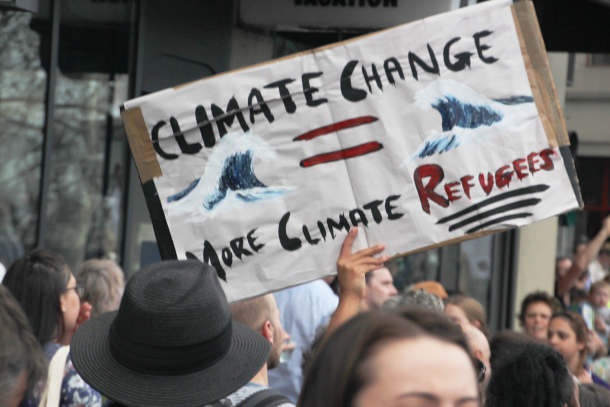
In September 2019 over 100,000 people participated in a climate strike in Melbourne, Australia. (Photo: Takver from Australia, Wikimedia Commons, CC BY-SA 2.0)
O’NEILL: It’s Living on Earth, I’m Aynsley O'Neill.
CURWOOD: And I’m Steve Curwood.
People can be uprooted in the wake of disasters such as wildfires, floods, storms and crop loss linked to climate disruption. But the relentless heating of the Earth is prompting some people to move even if they have not been caught in the crosshairs of a climate-related catastrophe. Journalist Abrahm Lustgarten has written a book about how life in the United States as we know it will become unfeasible as temperatures rise, which he says will accelerate an internal migration trend which has already begun. His book is called On the Move: The Overheating Earth and the Uprooting of America, and he joins me now from his home in the Bay Area of California. Welcome back, Abrahm.
LUSTGARTEN: Thanks for having me. Good to be here.
CURWOOD: Great to have you back. Why write this book?
LUSTGARTEN: Well, the book arose out of a series of articles that I wrote in 2020 for ProPublica and the New York Times Magazine that looked at how climate change was going to displace people and how it would lead to a new era of what I think will be mass migration in the future in general. And you can slice that a million different ways, many of which are important. But one thing that came up through that reporting was the fact that climate change was going to displace Americans as well, and it was going to displace potentially myself. And in the course of reporting, I was I live in California, and I was really confronted by a disastrous set of wildfire seasons, and it really got me thinking. At the same time that I was doing this reporting and writing these articles about how climate change was going to affect my life, how it might affect Americans' lives, and why we're relatively privileged and sheltered from climate impacts compared to so many other parts of the world. Change is coming nonetheless, and I became really intently focused and curious on what that change was going to look like for the United States.
CURWOOD: In your very thorough style, Abrahm, you have drilled into many, many aspects of what the increasing displacement due to climate disruption, that impact that it's going to have on us. But let me ask you another kind of broad question, and not a simple one. Who is a climate migrant?
LUSTGARTEN: Yeah, you know, everybody's got a different definition for this, and I tend to take the broadest and most flexible definition. So to me, a climate migrant is somebody whose decision to move or whose displacement has in some tangential way, been influenced by the change in our environment and by the pressures of climate change. And, you know, people have always moved, migrated for reasons around conflict, persecution, economic opportunity. I think those are kind of the standard explanations for the factors that drive migration. And I've been really interested in how environmental change plays into that. And moving away from this cliche idea that a climate migrant is only somebody who's been displaced by environmental change alone. And so I'd like to look at a set of more complex and nuanced factors, the way that environmental change might put somebody in a situation where conflict then displaces them. So I think very broadly about it, and if environmental change has any role in moving a person out of their homeland and into a new location. I consider them a climate migrant.
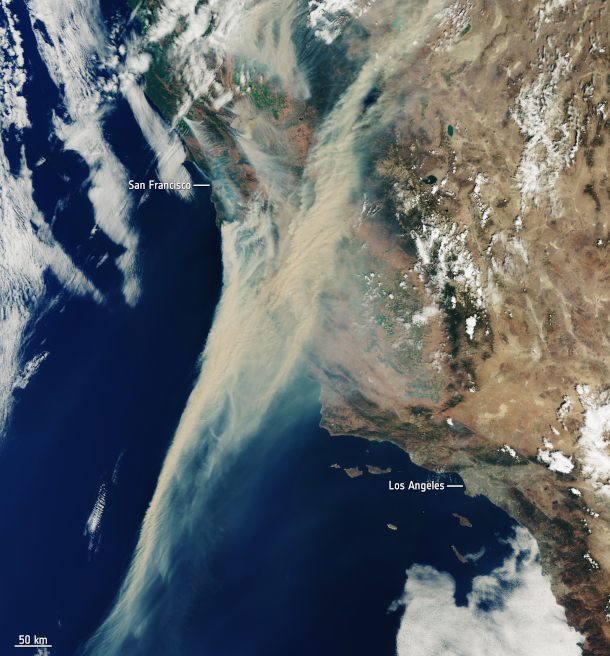
A Sentinel-3 satellite image from August 19th, 2020 shows widespread smoke from California wildfires. Extreme heat, winds, and storms fueled dangerous conditions, forcing evacuations near the San Francisco Bay Area. (Photo: Copernicus Sentinel image, Wikimedia Commons, processed by ESA, CC BY-SA IGO 3.0)
CURWOOD: That's right. I mean, people move, as you say, for a number of reasons, economics, opportunity, conflict. So to what extent do you think that climate becomes that proverbial straw on the camel's back for many people?
LUSTGARTEN: Yeah. I mean, I think it absolutely is, and I think that that makes it hard to identify or to single out for many people as well. I, for example, spoke with, spent some time with a woman in San Salvador who was victim of gang violence there and was looking to move to the United States. And so she would be typically described as a person persecuted under difficult gang situations, but she would prefer to move back to her hometown. But her hometown, this small village in the mountains in El Salvador, was suffering from a coffee fungus that was driven by climate change. So I describe her as an environmental migrant, as a climate migrant, and the same way that somebody in California might move because their homeowner's insurance becomes too expensive because of the wildfires. They don't necessarily connect that idea with their fleeing wildfires, but they are ultimately driven to move because of that environmental change. And in those ways that environmental change, it can have an enormous effect, and it can literally displace people, like flooding in Houston, or it can have a very, very subtle, almost immeasurable effect that you know that proverbial straw on the camel's back that is almost unidentifiable, but does tip the scales in driving somebody to change their circumstances or change their location.
CURWOOD: So talk to me about the most climate risky places these days in the United States.
LUSTGARTEN: It's probably no great surprise, but the riskiest parts of the country are along the south, throughout the south, from the southwest all the way to the southeastern coast and the west coast. I based my reporting off of collection of empirical data modeled by the Rhodium Group. And we modeled very specific risks, risks like threat of wildfire, threat of drought, decline in crop yields, rising temperatures, economic harm, rising sea levels and those things. And if you map all of those, which I did, you see that many of them overlap. And what they essentially tell you is that the southern third of the country is significantly more at risk than the northern two thirds of the United States. To grossly overgeneralize, but that is kind of the trend. And so the projected or assumed. You know, reaction to that is that as people begin to move, to migrate because of these changes, that they will migrate from those regions northward.
The complex, contradictory and heartbreaking process of American climate migration is underway “At first, after the storm, it’s volunteers pulling out trash... Then, it’s not destruction, but the aftermath of destruction.” An excerpt from On The Move. https://t.co/lpP72TsTeZ
— Abrahm Lustgarten (@AbrahmL) April 11, 2024
CURWOOD: Abrahm, to what extent did you find that government policies in the US have deceived us about the risks of climate disruption?
LUSTGARTEN: You know, it's very hard to link cause and effect with certainty, but I looked closely at a number of disincentives that have arisen through American policy of one sort or another that have tended to encourage people to live in the path of great risk, and one of those that I focus on in the book is the role of homeowners insurance and property insurance, and we're having such a great conversation now nationally about insurance in the face of climate change, because it's becoming more expensive and is becoming harder to get. But for many, many years, insurance was used as a tool to make it seem safe to live in the path of disaster, and it was subsidized by states across the country to reverse or protect against the actual risk of out migration, of declining population. So in the book, I explore, for example, how after Hurricane Andrew in 1992 in Florida devastated parts of that state. And Florida was in an economic recession at the time, and its population began to move. And so the state, in an effort to keep people there created its own state run, state subsidized insurance plan. Called it a fair plan, called it Florida citizens eventually, and that plan promised that insurance would be available to everybody at a cheaper cost than they were already paying, no matter their circumstances. And that kind of system has now been replicated across 30 odd states. It's being used in California now to provide insurance to people who are at risk of wildfires, for example. And it has an effect of blunting the effects of climate change, because it blinds homeowners to the risks to their assets. It makes it seem safer, makes it seem easier to protect the value of their homes when they're in the path of risk than it actually is. And so that's one kind of mechanism that has disincentivized a logical response to environmental change.
CURWOOD: So in the United States, what does wealth have to do with climate risk?
LUSTGARTEN: Well, probably no surprise, but the wealth equals capacity to be resilient in the face of impact, and so it affects climate driven migration in a whole bunch of ways. But it also affects just our individual ability to protect ourselves or to rebuild in the face of disaster. So from a migration standpoint, the experts I talk to and the models kind of pinpoint a middle class as the most likely to move in response to climate change, because you need to have some degree of wealth to be mobile. But those with extraordinary wealth are also more likely to kind of have backup plans, maybe multiple homes, keep a farm in Vermont while living in Phoenix, Arizona, or something like that. So you know, the wealthy have greater flexibility to make dramatic changes at the last moment, and don't have to plan for them as much. And at the other end of the spectrum, you have the impoverished, but also just unwealthy parts of the country, and that's a whole other part of the story. I mean, we will have communities in the United States, as we will around the world, who are trapped by the circumstances of their changing climate and cannot migrate for a number of reasons, one of them being economic. And that's going to be a growing part of the climate change story, of the social story around climate change, and it's already been a part of the inequities of how climate change has affected American communities and affected communities across the country, where lower income communities and many minority communities have already borne a very disproportionate brunt of the environmental changes we've seen so far. We can expect that to happen in the future, and then we can expect those same segments of our population to be less mobile and a little less resilient to the opportunities to to migrate in response to it in the future.
CURWOOD: Little hard to move when you're on a fixed income, say, from Social Security or something and everything's balanced out where you live today to think about moving to someplace else tomorrow;
LUSTGARTEN: That's exactly right.
CURWOOD: Not to mention giving up your friends and community.
LUSTGARTEN: So friends and community are, you know, a real intangible part of this conversation and a real draw factor to keep people from moving as is age. So when we start to think about trapped communities, it's that intersection of poverty, perhaps of age, of deep communities, of small communities, that makes it both painful and less and less practical to be able to respond by changing your location.
CURWOOD: Now what about relative wealth internationally, what does that have to do with climate risk? United States is fairly affluent. A lot of the rest of the world is not.
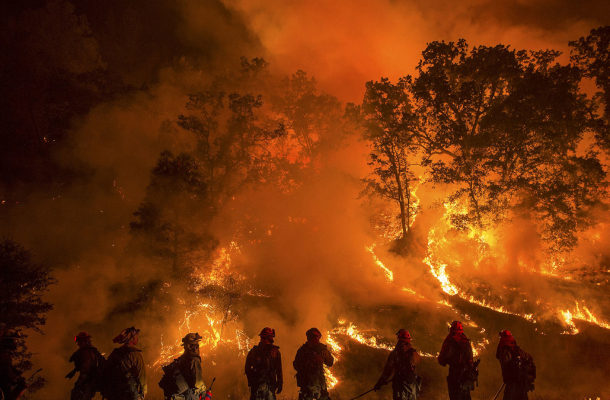
A wildfire engulfs a hillside by Highway 29 in Lower Lake, CA on Sept 13, 2015. The fast-moving Valley Fire devastated Middletown and surrounding areas, burning numerous homes and displacing thousands of residents, according to officials. (Photo: Jeff Head, Flickr, Public Domain)
LUSTGARTEN: Yeah I mean, I started the conversation by just kind of offering that caveat, that we are relatively privileged and relatively sheltered, though not immune from impact and change. And so globally, almost everybody is worse off than we are. Is the simplest way to see it. We have the most vulnerable nations in the world also are largely to generalize, you know, the most populated and they are also the most impoverished. And so from both a climate change perspective and a climate migration perspective, the hot spots of enormous risk are the equatorial regions around North Africa, South Asia, Central America. Many countries in which are among the poorest in the world and among the most populous. And it means that they have the least flexibility and the least amount of depth of resilience to adapt to these changes, and that they're also, you know, the most likely to have their populations migrate in search of better circumstances, and so the relative wealth of nations around the world means that the most populous parts of the world are going to be the hardest hit and the most likely to move but it also suggests that there's a great responsibility on the part of the wealthy parts of the world to stabilize the communities around them, maybe to make up for the damages that they're seeing and experiencing and will experience, and it gets really quickly into the loss and damage conversation about who's responsible for emissions that have caused climate change and who's responsible for mitigating the long term effects. And the climate migration conversation just really underscores the importance of that larger conversation about equity and debt, and what we as a wealthy nation owe to those other parts of the world that are going to be even harder hit.
CURWOOD: And now, what about Abram Lustgarten, who lives in the Bay area of California, you write in the book there were days just choking with the wildfire smoke. Doing the work that you've done these years, knowing that this is no joke: Climate disruption is for real. What's your decision?
LUSTGARTEN: My decision hasn't been made yet. Through the course of my experience in my reporting, it's given me a great appreciation for the complexity of migration and the complexity of making a decision about whether to move. It's forced me to reflect on why I live, where I live, and how I make that choice, so it's not a naive or a blind choice, and it's affected by so many other factors, like the fact that we have not had the kind of disastrous wildfire season that we had in 2017 2018 2019 2020 at the time, I began writing and began considering being forced to move myself. It seemed like we were on a linear trajectory towards an apocalypse, basically. And that's one context in which to make a decision, you know, about my own life. But the calmness that has followed those for a couple years, which I know empirically and objectively, is temporary. I mean, I see the data, I know what the climate risks are for the part of Northern California that I live in, and the long term story is not a positive one, but the short term story is a period of relief.
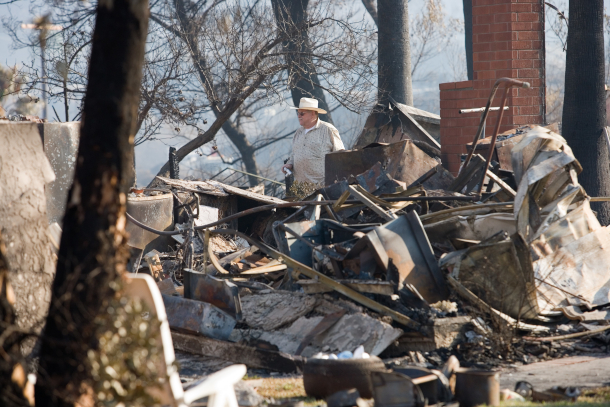
In this October 28, 2007 photo a group of friends assist one another in sifting through the ruins of a home in Rancho Bernardo, California, in the San Diego area. Photo: National Archives at College Park, Wikimedia Commons, public domain)
CURWOOD: So Abrahm, you're a reporter who's looked at climate disruption, but it's also moving you into being a philosopher about the way civilizations and societies function with this tsunami of climate disruption coming at us from your view. How are we set to deal with this as a society, both here in America and around the world?
LUSTGARTEN: Brittleness is a word that comes up a lot, both among the experts that I talk to, and I think it reflects my current feeling. There are bright spots in Americans' ability, I think, to adapt to the changes that are coming. There are organizations and communities and groups of political movements that are well poised to greet the change in a proactive way, prepare for it in ways that will lessen the blow, if you will. But I'm sorry to say that I'm a little more cynical about the larger average impact, and I think we see incredible political divisions in this country, and political divisions that are kind of replicated in countries around the world at this moment. I don't see those political divisions as being altogether separate from climate influences. I think that the way that these issues interact isn't totally clear yet, but the pressures of a changing climate, the pressures that it puts on migration and on border, policies of our country and on other countries, I think, is an unrecognized pressure. The cost of climate change, I think is a pressure on our fiscal health and on all the policies that result from it. And I don't think that I see, you know, a level of cooperation or preparedness or willingness to invest financially, or willingness to invest socially, quickly enough and at a scale enough that will really prepare us nationally for the changes that are coming. And so, you know, I think it's going to be a difficult era of successes surrounded by larger challenges.
CURWOOD: Abrahm's Lustgarten's book is called "On the Move: The overheating Earth and the uprooting of America. Thanks so much for taking the time with me today.
LUSTGARTEN: Thanks for having me on.
Related links:
- Get your copy of “On the Move: The Overheating Earth and the Uprooting of America" (Affiliate link supports both Living on Earth and local booksellers)
- Learn more about Lustgarten’s other works
[MUSIC: Lee Ritenour, Dave Grusin, “Water To Drink (Agua De Beber)” on The Very Best of Lee Ritenour, The Verve Music Group]
CURWOOD: Living on Earth is produced by the World Media Foundation. Our crew includes Naomi Arenberg, Shanzay Asif, Paloma Beltran, Kayla Bradley, Josh Croom, Jenni Doering, Karen Elterman, Daniela Faria, Swayam Gagneja, Sommer Heyman, Mark Kausch, Mark Seth Lender, Don Lyman, Nana Mohammed, Sophia Pandelidis, Jake Rego, Andrew Skerritt, El Wilson, and Jolanda Omari.
O’NEILL: Tom Tiger engineered our show. Allison Lirish Dean composed our themes. You can hear us anytime at L-O-E dot org, Apple Podcasts and YouTube Music, and like us, please, on our Facebook page - Living on Earth. We tweet from @livingonearth. And find us on Instagram @livingonearthradio. And you can write to us at comments@loe.org. I’m Aynsley O’Neill.
CURWOOD: And I’m Steve Curwood. Thanks for listening!
ANNOUNCER: Funding for Living on Earth comes from you, our listeners, and from the University of Massachusetts, Boston, in association with its School for the Environment, developing the next generation of environmental leaders. And from the Grantham Foundation for the protection of the environment, supporting strategic communications and collaboration in solving the world’s most pressing environmental problems.
ANNOUNCER 2: PRX.
Living on Earth wants to hear from you!
Living on Earth
62 Calef Highway, Suite 212
Lee, NH 03861
Telephone: 617-287-4121
E-mail: comments@loe.org
Newsletter [Click here]
Donate to Living on Earth!
Living on Earth is an independent media program and relies entirely on contributions from listeners and institutions supporting public service. Please donate now to preserve an independent environmental voice.
NewsletterLiving on Earth offers a weekly delivery of the show's rundown to your mailbox. Sign up for our newsletter today!
 Sailors For The Sea: Be the change you want to sea.
Sailors For The Sea: Be the change you want to sea.
 The Grantham Foundation for the Protection of the Environment: Committed to protecting and improving the health of the global environment.
The Grantham Foundation for the Protection of the Environment: Committed to protecting and improving the health of the global environment.
 Contribute to Living on Earth and receive, as our gift to you, an archival print of one of Mark Seth Lender's extraordinary wildlife photographs. Follow the link to see Mark's current collection of photographs.
Contribute to Living on Earth and receive, as our gift to you, an archival print of one of Mark Seth Lender's extraordinary wildlife photographs. Follow the link to see Mark's current collection of photographs.
 Buy a signed copy of Mark Seth Lender's book Smeagull the Seagull & support Living on Earth
Buy a signed copy of Mark Seth Lender's book Smeagull the Seagull & support Living on Earth

